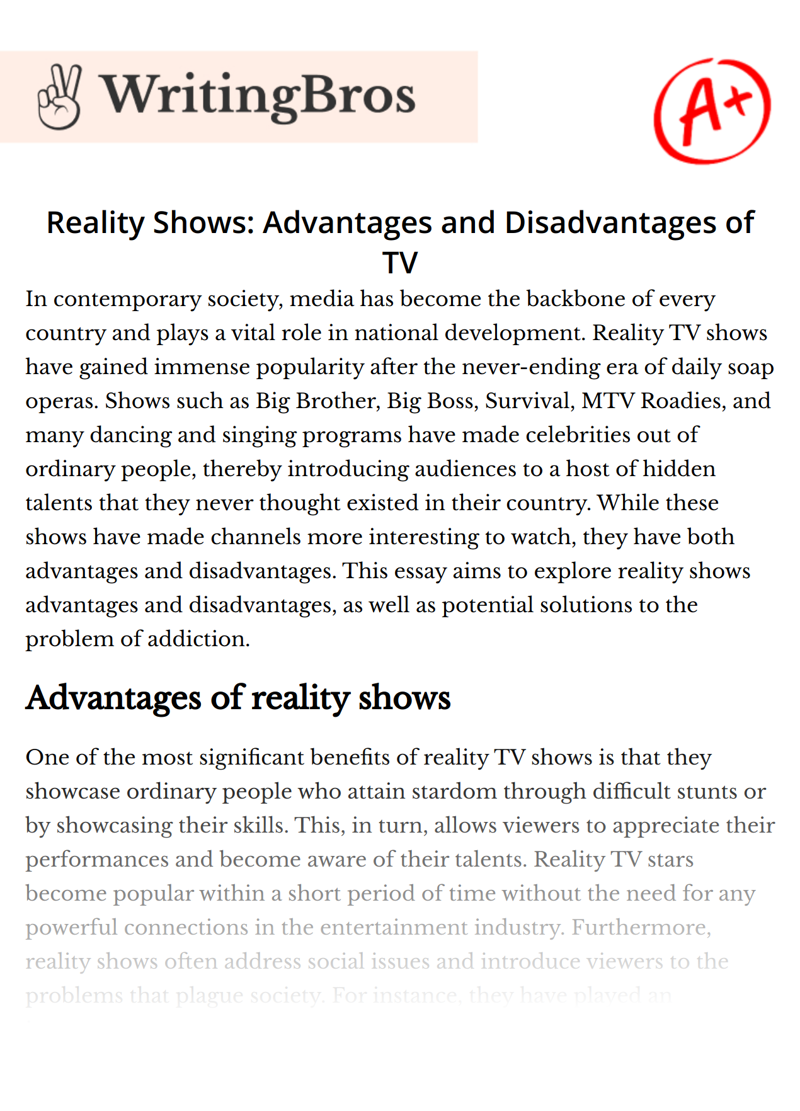Reality Shows: Advantages and Disadvantages of TV

Table of contents
In contemporary society, media has become the backbone of every country and plays a vital role in national development. Reality TV shows have gained immense popularity after the never-ending era of daily soap operas. Shows such as Big Brother, Big Boss, Survival, MTV Roadies, and many dancing and singing programs have made celebrities out of ordinary people, thereby introducing audiences to a host of hidden talents that they never thought existed in their country. While these shows have made channels more interesting to watch, they have both advantages and disadvantages. This essay aims to explore reality shows advantages and disadvantages, as well as potential solutions to the problem of addiction.
Advantages of reality shows
One of the most significant benefits of reality TV shows is that they showcase ordinary people who attain stardom through difficult stunts or by showcasing their skills. This, in turn, allows viewers to appreciate their performances and become aware of their talents. Reality TV stars become popular within a short period of time without the need for any powerful connections in the entertainment industry.
Furthermore, reality shows often address social issues and introduce viewers to the problems that plague society. For instance, they have played an important role in enhancing women's empowerment in society. With active discussions on TV forums, reality shows have made people more aware of what is happening in their locality. Reality TV has also helped to launch the careers of many celebrities who have become big stars in their own right. Audiences also become aware of the hazards of different types of addictions, such as alcohol and drugs, in society.
Disadvantages of reality TV shows
The majority of so-called reality shows are scripted, and everything is pre-planned. Initially, viewers were attracted to the shows, but they now realize that the stories are developed well in advance. Some of the fights on television are staged to increase the ratings of the show. Additionally, these shows can have harmful effects on teenagers who may confuse the perceived reality of these programs with real life.
Moreover, the new generation of reality TV celebrity stars does not thrive on talent, but instead use sensationalism to always be in the news. One of the worst effects of their actions is on teens who try to emulate their behavior. Stunts that are performed on television under controlled conditions are imitated by people in real life, resulting in death. Some shows that feature contestants participating to win prizes show them in a poor light, as they use meanness and greed to outdo each other. The negative traits can manifest themselves in the audiences and create behavioral problems. Reality TV is dishonest because it pretends to show "reality," but it actually distorts the truth to suit the program makers.
Solutions to overcome the addiction of reality shows
To overcome addiction to reality shows, one could substitute TV time with family activities such as a game night, an evening walk, or a game of badminton. Interacting with family members during such activities can bring everyone together in a healthy way.
It is important to understand how children view reality TV. Parents can initiate conversations with their children to gauge their perspectives on reality TV. They can ask questions such as: What is happening in the show, and how do people look and act? What is good or bad about some of the behavior you are watching together? These conversations can help parents better understand their children's perspectives and guide them towards making informed decisions about watching reality TV.
Conclusion
In conclusion, reality TV shows have both pros and cons. While they allow ordinary people to showcase their talents, they are often scripted and can have harmful effects on viewers. To overcome addiction to these shows, individuals can engage in healthy family activities, and parents can initiate conversations with their children to gauge their level of exposure to reality TV and discuss any concerns. Additionally, individuals can explore other forms of entertainment that are more enriching and educational, such as documentaries, podcasts, or books. Ultimately, it is important to strike a balance between entertainment and personal development, and to be mindful of the potential negative effects that reality TV can have on one's mental health and well-being. By making conscious choices about the media we consume, we can ensure that we are leading healthy and fulfilling lives.
References
- Andrejevic, M. (2004). Reality TV: The work of being watched. Rowman & Littlefield Publishers.
- Bell, M. (2015). Reality TV and class. In A. Hill (Ed.), Reality TV: Key ideas (pp. 135-150). Routledge.
- Choueiti, M., Khanduri, R., & Pieper, K. (2019). Inequality in 1,200 popular films: Examining portrayals of gender, race/ethnicity, LGBTQ, and disability from 2007-2018. USC Annenberg Inclusion Initiative.
- Hill, A. (2015). Introduction. In A. Hill (Ed.), Reality TV: Key ideas (pp. 1-10). Routledge.
- Holmes, S. (2004). Reality TV: Audiences and popular factual television. Routledge.
- Mastro, D. E., & Kopacz, M. A. (2016). Race, reality television, and stereotypes: Examining the content of network and cable reality series. Journal of Broadcasting & Electronic Media, 60(2), 208-227.
Cite this Essay
To export a reference to this article please select a referencing style below

